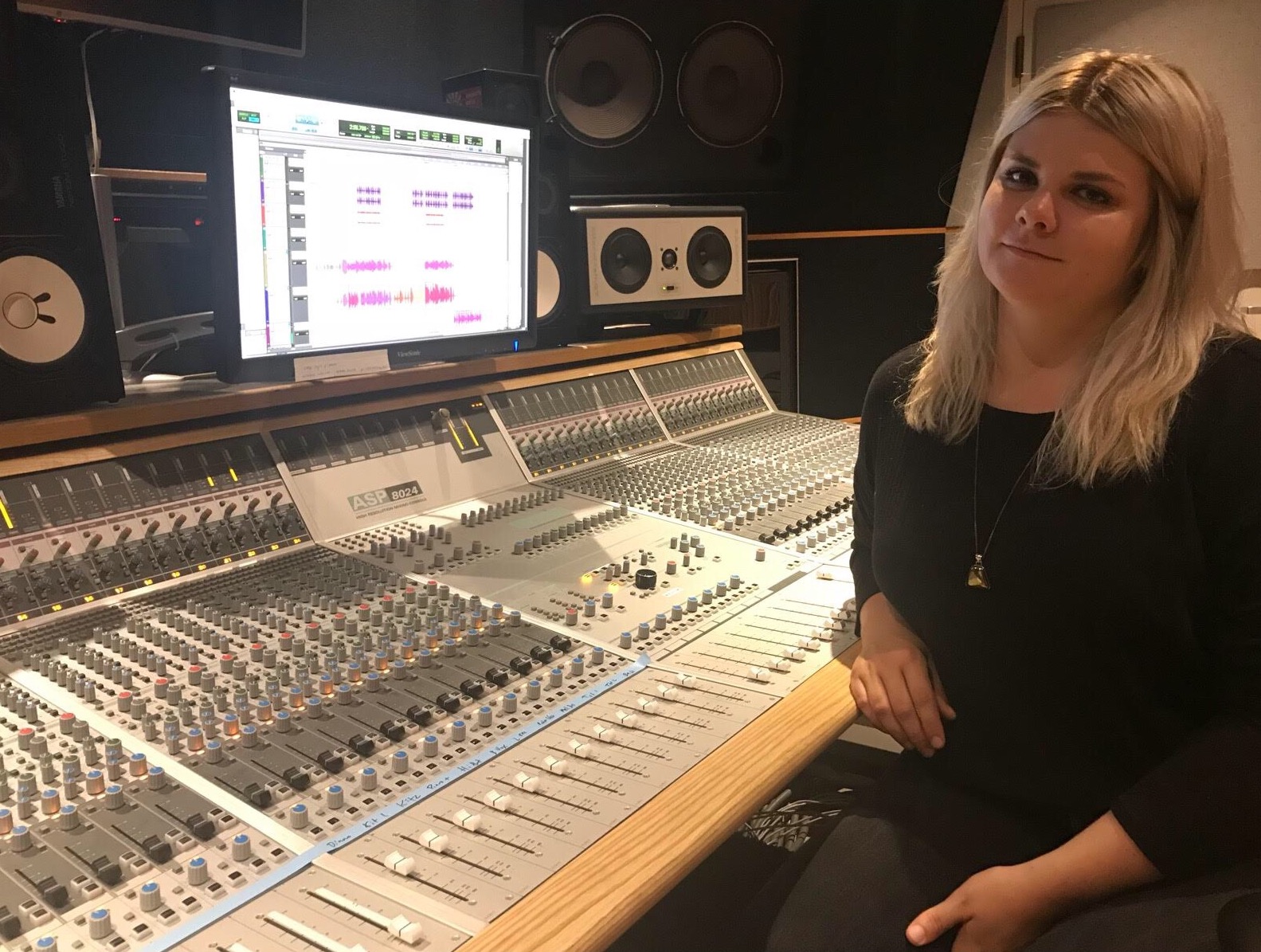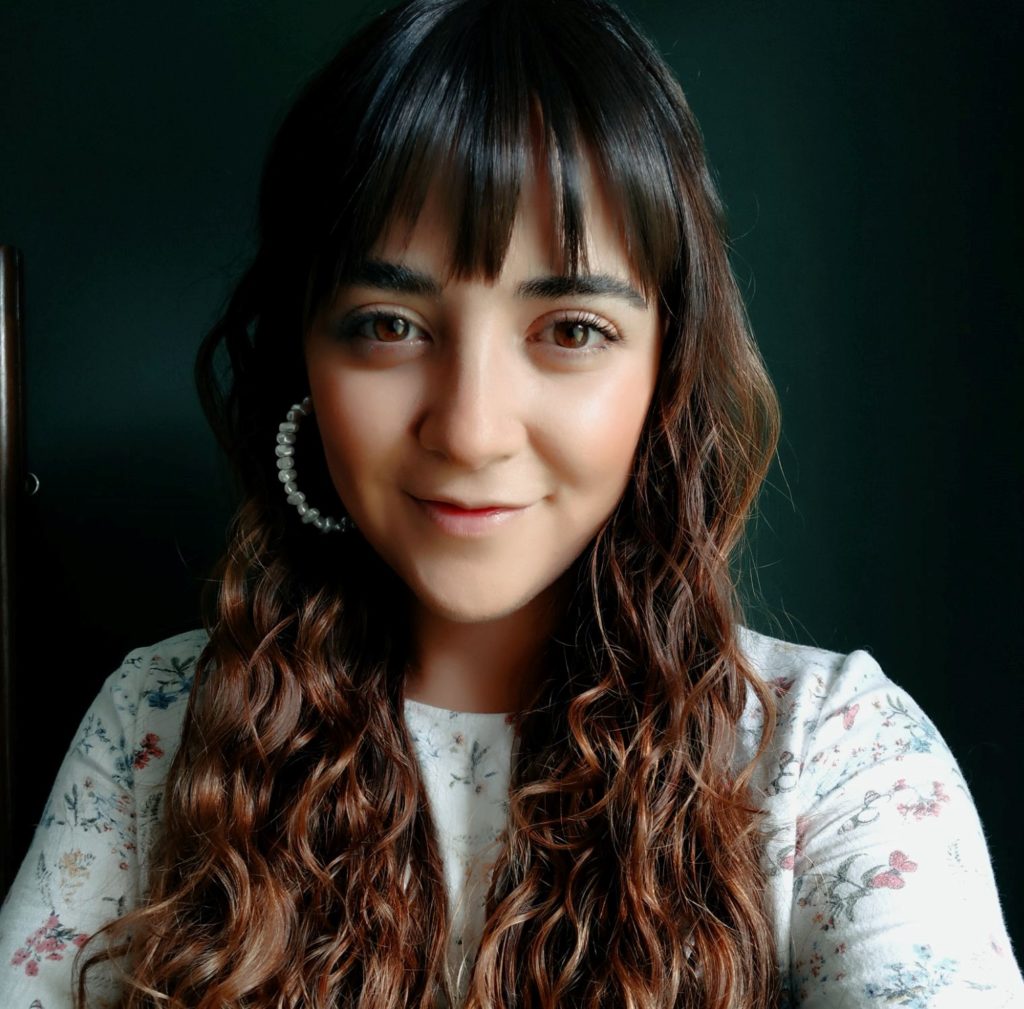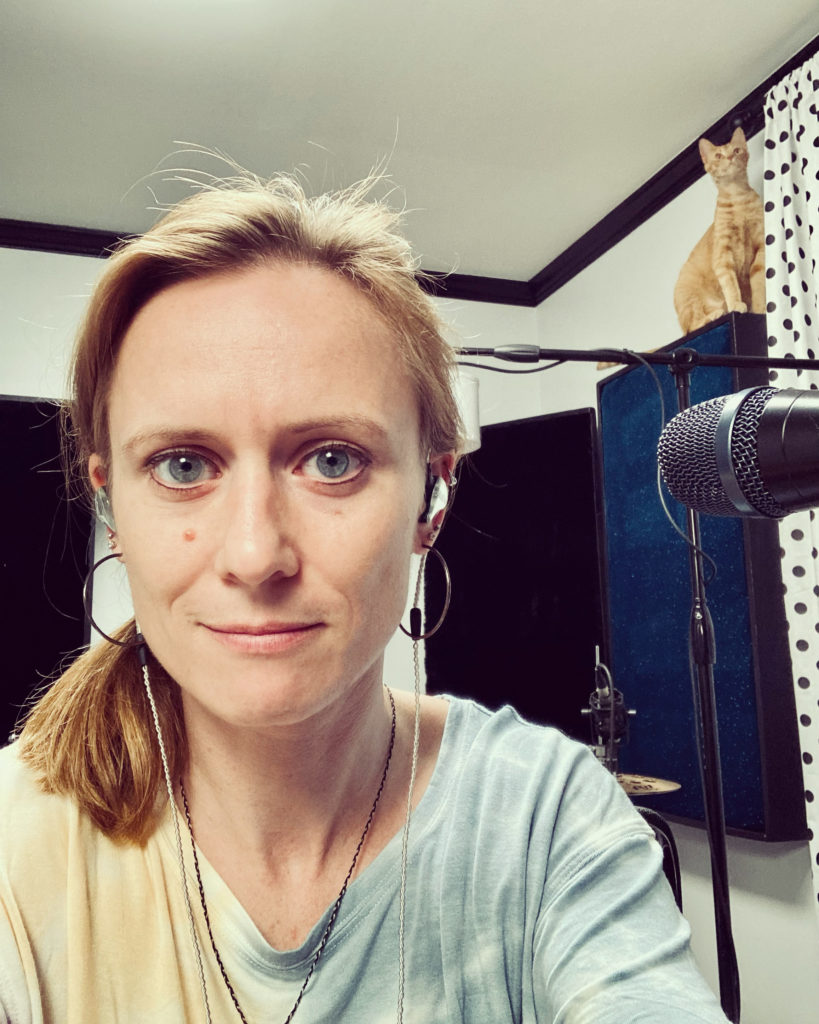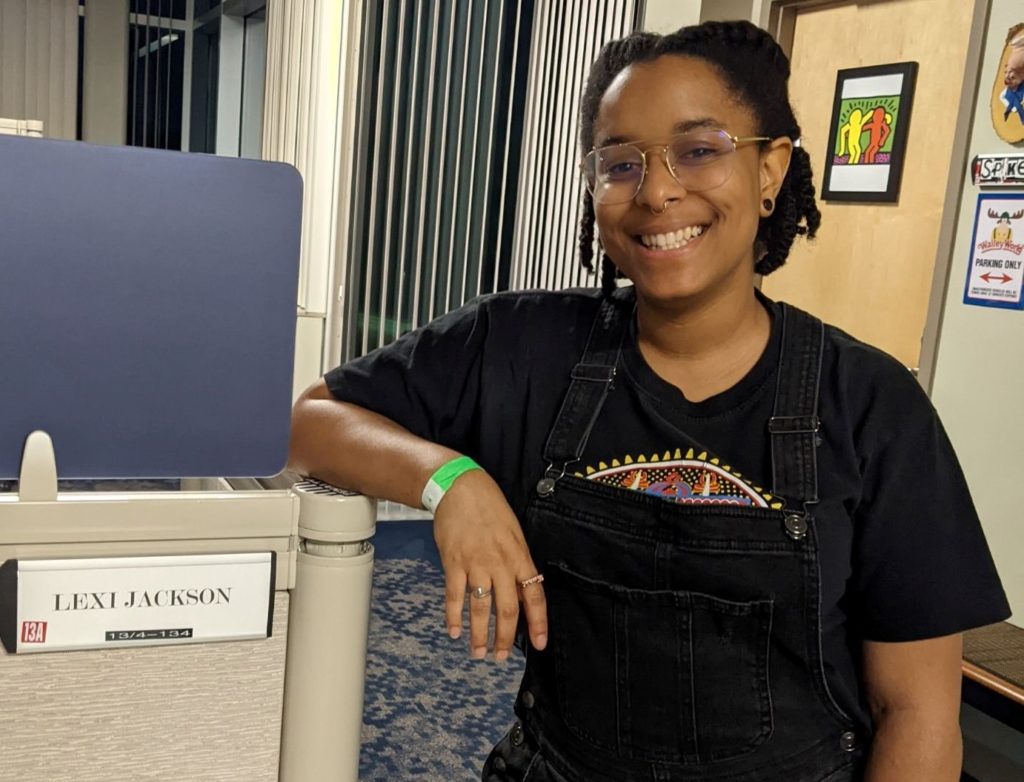Veronica Simonetti is the Lead Studio Engineer at Women’s Audio Mission (WAM) in San Francisco, California, where she has lived and worked for the past 4 years. Veronica has worked with a wide variety artists including Meklit Hadero, St. Lawrence String Quartet, Jessie Farrell, Lia Rose, Mariachi Femenil Orgullo Mexicano, Sonita Alizadeh, and FR333. She also has worked on a number of audiobooks, podcasts, and voiceovers for clients including Hachette Book Group, Simon and Schuster, National Geographic, Remembering Camp Trans, Reasonable Doubt, Webby Awards Podcast, and Pitch Makeover.
How long have you worked for Women’s Audio Mission? Can you talk about your career trajectory and your experience as someone starting as an intern to now being an integral part of the organization? How did that happen for you?
I’ve worked at WAM for four years. I interned there the summer of 2014 and started working there in the summer of 2015. I became an intern at WAM during the summer after my junior year in college and then went back to Indiana to finish school and graduate. After I graduated, I moved to SF and have been here ever since!
I started as a part-time employee and eventually became a full time employee. I have had many different responsibilities at WAM throughout my four years at the organization. I used to manage the interns, and teach some Girls on the Mic classes, in addition to many other responsibilities, but I have since moved on to focus solely on engineering, facilities management, and teaching a couple of adult classes a year.
What is your current title, and what are your main objectives at your job?
My title is Lead Studio Engineer, Facilities Manager, and Instructor. I am the head engineer at WAM’s recording studio and I also book the studio. I manage all of WAM’s facilities including our classroom space in Oakland. This entails keeping up with our gear and project managing facilities maintenance. I also teach our Intro to Pro Tools class as well as the Level 2 series of classes on multitrack recording, mic placement, and mixing.
I know you’ve worked directly with a lot of interns; can you describe what makes a “good” intern? Any traits that immediately stand out as good or bad?
I think a good intern is someone who is always thinking a step ahead. Someone who is always doing something to help out with whatever situation they’re in. For myself, as an intern, I was prepared to do the amount of work of someone who is working full time. I was always asking for additional projects to work on. I also said yes to every opportunity that came my way. Whether that was doing live sound or shadowing a recording session or touring a studio, I tried to absorb as much knowledge as possible, so then when the situation came for me to choose what I wanted to do, I was able to make an informed decision based on my experiences.
I think that even though I was an intern only a few years ago, times are different today. I know that people entering the workplace today are entering at a very competitive time with a load of debt on their shoulders, but I think it is important to remember to work hard towards what you want. If you know that you want to be in the audio industry, it is possible for you to break into it. It might just take a bit more work and a little more time than other industries.
I also think that finding mentors in your industry is super important. Finding people who you admire and learning how they navigated their career is a great way to think about your own and try to shape your path.
I remember when you first moved out to the Bay Area, you were working a few jobs to make ends meet until you were able to get a full-time position at WAM. Are you still picking up gigs or are you mostly settled at WAM? Can you talk about that balance and how you made it work?
The only side gig that I really do anymore is live sound for a rock camp for kids called Rock Band Land. The guys that run the camp are really great, and it’s an easy gig that occurs a few times a year. My schedule gets pretty full with sessions and events for WAM so it is hard to schedule many side gigs outside of WAM.
When I first started at WAM, I was hired part-time. I also got hired part-time as an audio preservationist at Bay Area Video Coalition. In addition to those two jobs, I picked up as many live sound gigs as I could. The first two years of my time in SF I was basically freelance. I liked being able to do something different every day and work in different places all over the city, but it was stressful to look at my schedule and see that my calendar was blank in two weeks. I had to learn that just because it’s blank now, doesn’t mean it won’t fill up in a week. Work was usually steady enough for me to get by, but there is something nice about the stability of a full-time job.
I think that there are great reasons to be freelance and great reasons to have a full-time job. I think finding what works for you is the most important and creating the balance that you find you need.
Where are your favorite spots to work in the Bay Area and why?
I enjoyed working at SOMArts. It’s this vast event space as well as an art gallery in the city. They have some of the best events I’ve ever worked in the city.
Also, the Verdi Club. They are a small events space in the Mission that is sort of a hidden gem. It’s been around for decades and the people working there are some of the nicest I’ve met in SF. I’ve been fortunate to work for almost solely nonprofits in SF. WAM, BAVC, and SOMArts are all nonprofits. It wasn’t on purpose, but I’m glad that it worked out that way. I feel like the people who work at nonprofits are there for the passion they have for the issue they are working towards, rather than having the main concern be making money. Money is definitely great, but I prefer to have passion for driving myself and the people around me.
What are your favorite parts about the work you do?
I love that I get to do something different every day. I love that WAM has given me so many opportunities to meet so many amazing people in the audio industry and has allowed me to see how many different paths a career can go.
In regards to engineering at WAM, I love that I have worked on such a huge spectrum of sessions in the studio. I have worked on such a wide range of projects from classical to rap to punk to audiobooks, voiceovers, and different types of podcasts. Some of the bigger sessions I’ve been lucky to lead were recording Neko Case and Jamila Woods interviews for Song Exploder, Kronos Quartet, projects with National Geographic, the Ethio-Jazz artist, Meklit, emerging R&B artist, Ruby Mountain, indie rocker Thao Nguyen, the Unladylike podcast, and Webby Awards podcast.
I love working with different clients every day. The engineering work I’ve been able to do at WAM is something I am so grateful to have been such a massive part of my career.
What are your goals for the next few years within WAM and in your engineering career?
It’s hard for me to think years ahead in the future. I’m more the type to go with the flow rather than plan ahead. I have discovered a love for podcasts that I didn’t realize I had before becoming an engineer. I would love to work in a way that is more focused on podcasts, but honestly, I’m pretty grateful for the place I’m at with my job at WAM right now.
Can you talk about what WAMCon is and its goals? What is the process of organizing that event like on your end?
WAMCon is an interactive recording conference for women and gender non-conforming individuals that WAM holds in various cities around the US. We have had sold-out conferences in Boston, LA, NY and Nashville with over 500 attendees total. We bring together some of the biggest music producers and engineers in the audio industry to deliver world-class workshops and panels on subjects like songwriting, mixing, vocal production, DSP processing, mic placement, music business, mastering, and more. WAMCon panelists have included big name producers and engineers like Grammy Award-winning mastering engineer, Emily Lazar; legendary music producer/songwriter, Linda Perry, who has worked with artists like Dolly Parton and P!nk; engineer Marcella “Ms. Lago” Araica, who has worked with Madonna and Missy Elliott, and Gena Johnson who worked with both Brandi Carlile and Kacey Musgraves.
It is a great way for WAM to connect with our membership that is spread all over the country and world. WAMCon also provides powerful networking opportunities, helping our members make connections with studios, companies and engineers and producers who are working in the cities they live in. Every city that we go to, we are welcomed with open arms and so many people telling us how important and necessary WAM’s work and presence is there. It is great to see engineers who are just getting started to make connections with each other and work together to break into the industry.
To organize the WAMCon conferences, we spend months before the event planning and coordinating. We are a nonprofit, so part of the planning process includes raising money, finding sponsors, and writing grants to support the conference. We have to find locations to host conferences, as well as find local engineers who would like to teach a workshop and secure top presenters for each conference.
What is the music scene and music community like in San Francisco? How has WAM’s presence contributed to that? What excites you about living there?
WAM has a huge presence in the music community in San Francisco. It is so common for me to be attending a show at a local venue, and to see a WAM member or former WAM intern running live sound. We pretty much have placed a woman engineer in every venue in San Francisco. There are also a lot of members and former interns who are working at various places in the Bay including Pixar, Skywalker Sound, Google, Facebook, Dolby Laboratories, Pandora, among others. WAM has contributed to the music community in the Bay by training and placing women in such a wide range of positions. There is a very strong culture in the Bay of passing your job onto another WAM member to help pass along the position to all of the many qualified women who are already working in the industry but may not have had a chance for their big break yet. WAM creates a community for networking and support through our membership and through our six-month internship program.
WAM also provides low-cost recording services for independent artists in the Bay Area and performance opportunities through our quarterly Local Sirens: Women in Performance Concert Series held at Rickshaw Stop. Our world-class studio has hosted multiple projects from Kronos Quartet, Angélique Kidjo (2014 GRAMMY), tUnE-yArDs, Clarence Jones (MLK’s speechwriter), Toro Y Moi, Oscar-nominated soundtrack “Dirty Wars,” Salman Rushdie/NPR, National Geographic, ESPN, Disney, and more.
What are the biggest challenges you’ve faced while working at WAM?
Honestly, the biggest challenge I’ve faced is when people undermine my knowledge in the studio. Some have assumed that I am a student or intern when I am in fact the one engineering their session. I think part of that has been from my confidence in the studio, which has definitely grown more in the past few years. Also, I think that most people are not used to seeing a woman as an engineer and of authority. It might be misogyny that’s buried deep down inside, but it’s still there. I have learned to overcome this challenge by knowing that I am qualified to be in the position I’m in and to show the person why that is so. The rest, I just let roll off my back.
Also, I am continually learning new subjects and techniques in the audio industry. I think that is a super important part of growing as an engineer and keeping up with the fast-changing technology.
What do you think are some of the biggest challenges women working in audio face? What are things we can all do to make things better for everyone in this realm?
One of the biggest challenges that women face in the industry, I think, is finding opportunities. It can be tough to get your first break and start working in the industry. It takes a lot of perseverance, time, and self-confidence that can be very hard for women to find.
I think that it would be helpful for people in the industry to be open to giving all people the same, equal chance. It would be great if women didn’t feel the need to prove themselves more and show their knowledge of the subject to prove that they are equal to their peers. I know that the industry is a lot better than 20, even ten years ago, but I know that we all still have a long way to go.
Also, it’s important not to let things happen that you are not comfortable with. If you feel like you are not being treated the way you would like to be, you are most likely correct, and you deserve to either talk to the person or company who is mistreating you or extract yourself from the situation.
Do you have any advice for young women starting a career in audio?
My advice is to be confident, but also be open to learning. I believe that audio is universal, but each studio and facility works a little differently from each other. It’s really good to have a basis of knowledge of audio before entering an internship or your first job, but it’s super important to remember that you are always going to be learning new things. I am continually learning new things about audio to this day, and I hope I always do.
Also, if you can’t find the right opportunity for yourself, it is always an option to start your own thing! You might find that that is the only way to do what you want to do.
What are your favorite/desert island pieces of gear you’ve used?
I love using the Avedis MA-5 and Great River mic pres in WAM’s studio. Those are my go-to’s for any sort of vocal session, whether it’s singing, rapping, or podcasts. I also love all of the Universal Audio and Eventide plugins that WAM has at the studio. There is such a large selection of them, they are made so well, and give you such a wide range of elements to manipulate.
What are you working on that you’re excited about?
I am currently producing a podcast with a couple of friends. It’s about our dating experiences in the Bay. It’s been really fun to be a part of a project from the start and to have a creative say in the content. We are still in the process of recording and editing, but I’m sure I’ll post about it on my Instagram when it gets released! I would like to keep producing as many podcasts as I can possibly fit into my schedule!
Also, I’m looking forward to WAMCon in Los Angeles on August 16 and 17th! We’ll be at Disney and Youtube, and I can’t wait to see their spaces and meet our WAM members in LA!
Anything else to add? How can we connect with you?
You can find me on Instagram @ron_ronette, or on the web at veronicasimonetti.com. Feel free to DM me there or send me an email at vsimonetti@womensaudiomission.org.
You are always welcome to email WAM at info@womensaudiomission.org with any questions about how to get more involved, our internship program, recording in our studio, and anything else you may have questions about!



